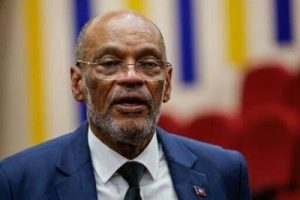Haiti’s Prime Minister Ariel Henry has tendered his resignation following an emergency summit with the Caribbean Community (CARICOM). The 15-member regional bloc convened in response to the escalating political crisis in Haiti, seeking a resolution to the turmoil that has gripped the nation.
Prime Minister Henry’s resignation came into effect on Monday, March 11, marking a significant shift in Haiti’s political landscape. The announcement was confirmed by Mohammed Irfaan Ali, the President of Guyana and the current chairman of CARICOM. In a statement released to the press, President Ali acknowledged the resignation, stating, “We recognize Prime Minister Henry’s decision to step down, which paves the way for the formation of a transitional presidential council and the appointment of an interim prime minister.”

The resignation follows weeks of intense negotiations and widespread calls for change within Haiti, a country that has been plagued by political instability and economic challenges. The move is seen as a step towards stabilizing the government and addressing the urgent needs of the Haitian people.
CARICOM leaders have expressed their commitment to supporting Haiti during this transitional period. The establishment of a transitional presidential council is expected to oversee the country’s governance until a new, democratically elected government can be installed.
As Haiti faces this pivotal moment, the international community watches closely, hopeful that this change will lead to a more secure and prosperous future for the Haitian people. The interim prime minister’s identity and the composition of the transitional council are yet to be announced, but the developments are a clear indication that Haiti is on the path to reform and recovery.

For now, the citizens of Haiti and observers around the globe await further details on the next steps in this unfolding political saga.



